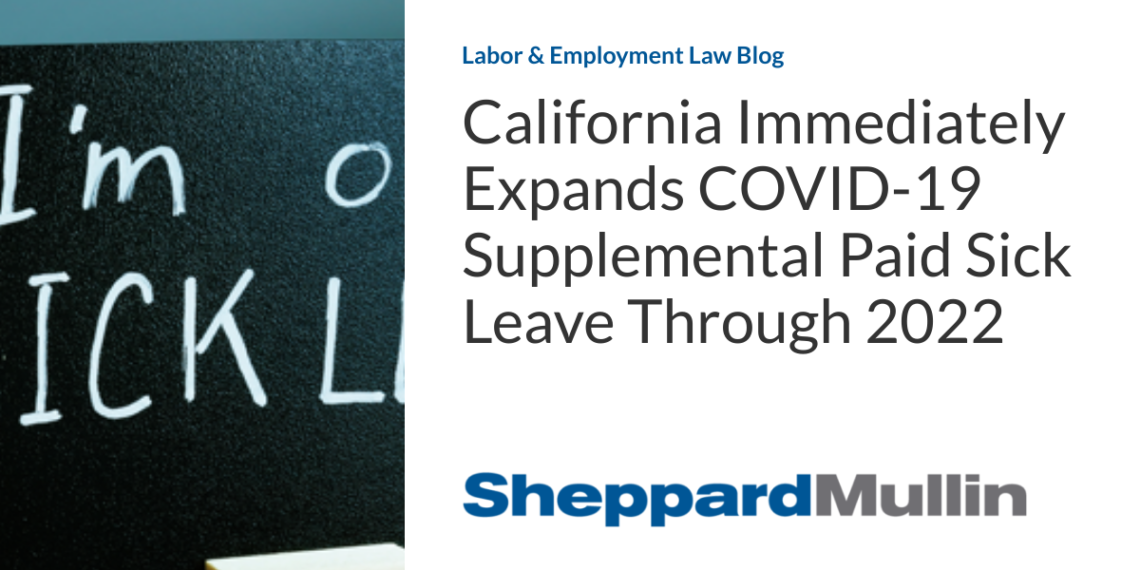[ad_1]
In February 2022, California enacted Senate Bill (“SB”) 114, which created California Labor Code section 248.6 to provide COVID-19 Supplemental Paid Sick Leave (“CSPSL”) to covered employees. CSPSL was due to expire on September 30, 2022. On September 29, 2022, Governor Gavin Newsom signed Assembly Bill (“AB”) 152, which (1) extends CSPSL through December 31, 2022, (2) provides employers the ability to require an additional diagnostic test before employees use CSPSL in certain circumstances, and (3) creates a grant program to assist qualified small business and nonprofits with grants for costs incurred for CSPSL provided in 2022.
Extension of Supplemental Paid Sick Leave
Under SB 114, California employers with 26 or more employees were required to provide up to 80 hours of CSPSL in two batches (each batch permitting up to 40 hours of CSPSL) after January 1, 2022, through September 30, 2022. AB 152 now extends this paid leave until December 31, 2022.
AB 152 does not provide any additional or new leave to current employees. Rather, it extends the deadline for an eligible employee to use CSPSL from September 30, 2022, to December 31, 2022.
An employee hired on or after October 1, 2022 is also eligible to use CSPSL.
Expanded Diagnostic Testing
Previously, employees could use their second batch of up to 40 additional hours of CSPSL only if the employee or the employee’s family member, for whom the employee is providing care, tested positive for COVID-19. When an employee sought to use their second batch of CSPSL because of their own positive COVID-19 test, employers could require the employee to submit documentation of their original positive test and were permitted to deny an employee’s use of additional CSPSL if the employee refused to submit this documentation. Employers could also require the employee to submit to a diagnostic test on or after the fifth day after the original positive test was taken and provide documentation of those results. However, it was unclear if employers could deny an employee’s use of additional CSPSL if the employee refused to submit to the diagnostic test.
Now, under AB 152, if the result of the diagnostic test is positive, an employer may require the employee to submit to a second diagnostic test within no less than 24 hours. In addition, AB 152 clarifies that an employer may deny an employee’s use of their second batch of additional CSPSL if the employee refuses to submit to either diagnostic test.
As was the case previously, any diagnostic testing must be at no cost to an employee.
New Grants for Small Employers Providing CSPSL
AB 152 also establishes the California Small Business and Nonprofit COVID-19 Relief Grant Program within the Governor’s Office of Business and Economic Development. This program will assist qualified small businesses and nonprofits with grants for actual costs incurred for CSPSL provided in 2022. Those qualified small businesses and nonprofits can receive a maximum grant of up to $50,000, which will not count as “gross income” for state tax purposes. The program is set to be repealed on January 1, 2024.
In order to qualify, small businesses and registered nonprofits must:
- be a “C” corporation, “S” corporation, cooperative, limited liability company, partnership, or limited partnership, or a registered 01(c)(3), 501(c)(6), or 501(c)(19);
- have begun operating before June 1, 2021;
- be currently active and operating;
- have 26 to 49 employees and provide payroll data and an affidavit, signed under penalty of perjury, attesting to that fact;
- have provided COVID-19 Supplemental Paid Sick Leave; and
- provide certain organizing documents including:
- a 2020 or 2021 tax return or Form 990; and
- a copy of official filing with the Secretary of State or local municipality (e.g., Articles of Incorporation, Certificate of Organization, Fictitious Name of Registration, 501(c)(3) registration, or Government-Issued Business License)
Next Steps
Employers should continue to comply with CSPSL through the end of 2022. While employers may require further diagnostic testing, employers must ensure that they cover the costs of those tests. Further, if CSPSL is provided, then eligible small and nonprofit employers should consider applying for a state grant to cover any costs incurred as a result of CSPSL.
While AB 152 expands CSPSL, local COVID-19 supplemental paid sick leave ordinances may still apply or require additional leave as well. Specifically, San Francisco, Oakland, Los Angeles, and Long Beach have further COVID-19 supplemental paid sick leave ordinances that may apply in addition to CSPSL. This article is not intended to be an unequivocal, one-size fits all guidance, but instead represents our interpretation of where applicable law currently and generally stands. This article does not address the potential impacts of the numerous other local, state and federal orders that have been issued in response to the COVID-19 pandemic, including, without limitation, potential liability should an employee become ill, requirements regarding family leave, sick pay, and other issues.
[ad_2]




